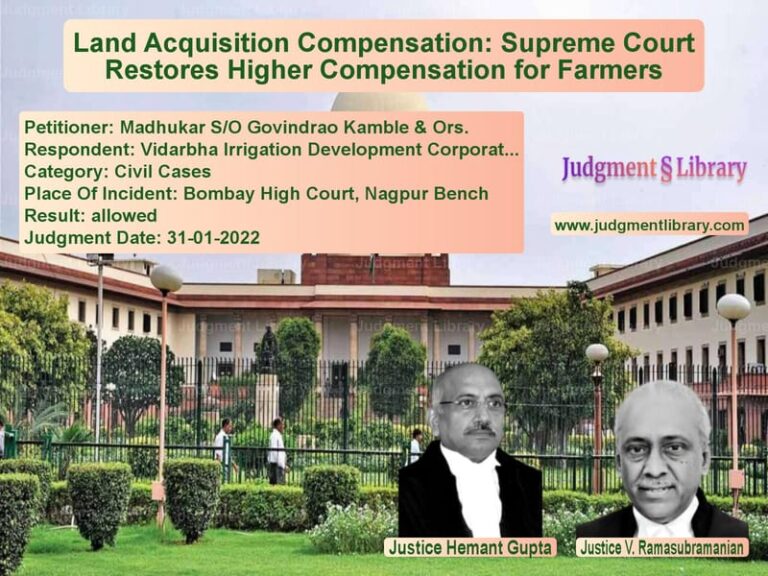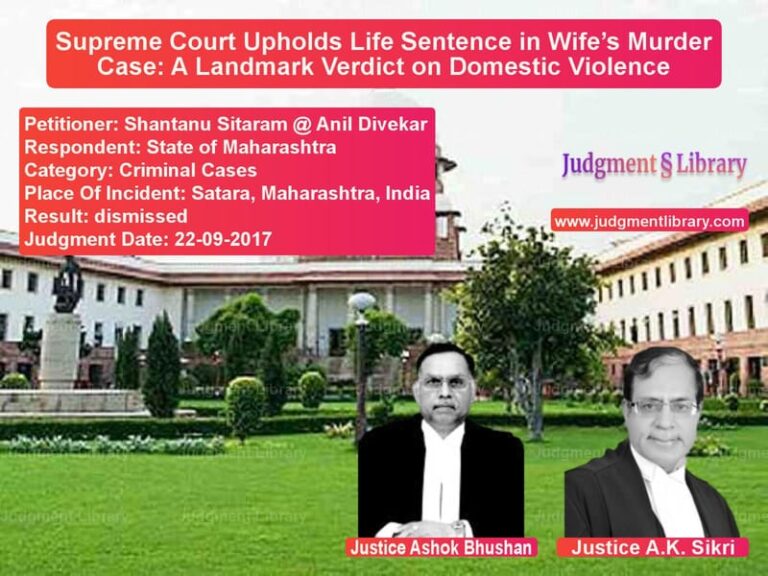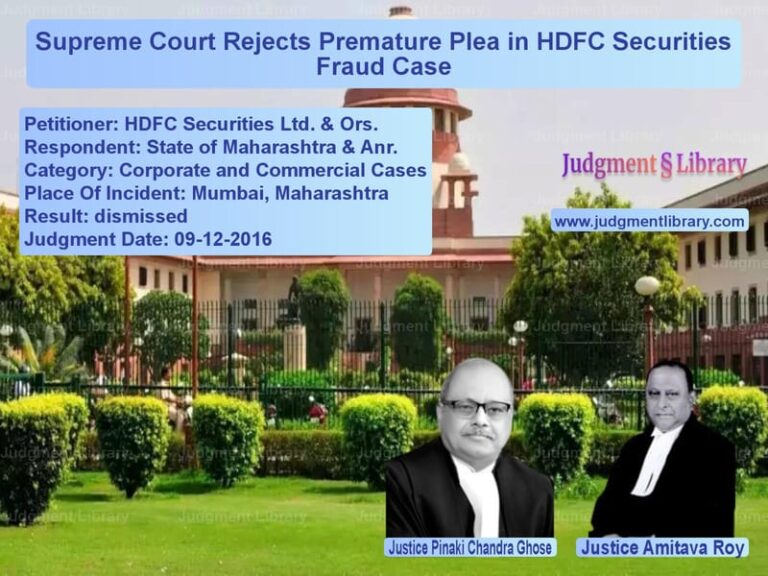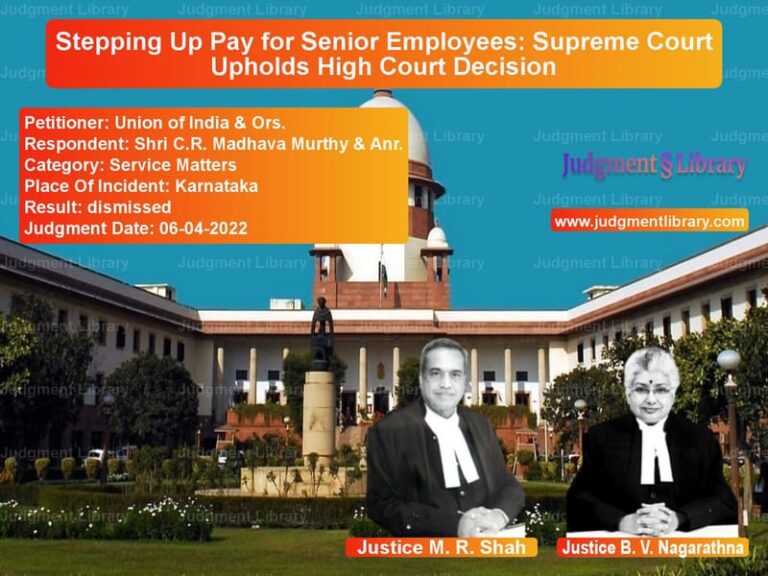Supreme Court Reinstates Class-IV Employee After Wrongful Termination for Direct Representation
The Supreme Court of India has ruled in favor of Chatrapal, a Class-IV employee, reinstating him in service after he was dismissed for making direct representations to higher authorities regarding salary discrepancies and allegations of harassment. The Court held that the charges against him were not severe enough to warrant termination, and the findings of the disciplinary proceedings were perverse. This judgment reinforces the principle that disciplinary actions should be proportional and based on substantial evidence.
Background of the Case
Chatrapal was initially appointed as an Ardly (a Class-IV post) in the Bareilly Judgeship and later transferred as a Process Server to the Nazarat Branch in Baheri, District Bareilly, on August 24, 2001. Despite assuming his new role, he continued receiving the salary of an Ardly instead of the revised pay for a Process Server. After repeated representations, he alleged harassment by the Central Nazir and other officials, which led to a departmental inquiry and his eventual dismissal on April 30, 2007.
Legal Challenges
Chatrapal challenged his dismissal before the Allahabad High Court, which upheld the termination, leading him to appeal to the Supreme Court. His primary argument was that his representations were made in good faith, seeking legitimate redress, and should not have resulted in termination.
Arguments by the Petitioner (Chatrapal)
- The charges against him were vague, and the inquiry officer failed to establish any specific misconduct.
- The main allegation was that he directly approached the High Court and government officials regarding salary discrepancies, which should not be considered a severe offense.
- He was denied access to crucial documents during the inquiry, which prejudiced his defense.
- His dismissal was disproportionate to the alleged misconduct and violated principles of natural justice.
Arguments by the Respondent (State of Uttar Pradesh)
- Chatrapal bypassed the official hierarchy by directly making representations to senior officers, which amounted to insubordination.
- The language used in his complaints was inappropriate and contained false allegations against the District Judge and other officials.
- The departmental inquiry found him guilty, and the decision to terminate him was justified.
Supreme Court’s Observations
1. Perverse Findings in the Inquiry Report
The Court found that the first charge—that Chatrapal made false allegations against senior officers—was based on a misinterpretation of his complaint. The Court stated:
“The finding that the appellant’s statement in his representation was false is not supported by the record. The charge itself was vague, and no specific allegations were proven.”
2. Direct Representation Does Not Warrant Termination
The Court acknowledged that while employees are expected to follow proper channels for grievances, directly approaching higher authorities does not constitute major misconduct warranting termination. The judgment emphasized:
“A Class-IV employee, when in financial hardship, may represent directly to higher officials. This by itself cannot amount to a major misconduct warranting dismissal.”
3. Violation of Principles of Natural Justice
The Court observed that Chatrapal was not provided with key documents during the inquiry, denying him a fair opportunity to defend himself. Citing previous rulings, the Court reiterated that findings based on procedural lapses are unsustainable.
4. Disproportionate Punishment
The Court held that even if the charges were taken at face value, dismissal from service was an excessive punishment. It ruled that the principle of proportionality must be applied in disciplinary actions.
Final Judgment
- The Supreme Court set aside the High Court’s order upholding Chatrapal’s dismissal.
- The dismissal order dated April 30, 2007, was quashed.
- Chatrapal was reinstated in service with all consequential benefits.
- The Court clarified that proportionality in disciplinary actions is essential.
Legal and Administrative Implications
1. Protection Against Wrongful Termination
This ruling strengthens employee rights, ensuring that minor infractions do not lead to harsh penalties.
2. Importance of Due Process in Departmental Inquiries
The judgment reiterates that inquiry proceedings must be fair and based on clear evidence.
3. Balancing Discipline with Employee Rights
The decision reinforces that while workplace discipline is important, it must be enforced within reasonable limits.
Conclusion
The Supreme Court’s judgment in Chatrapal’s case is a landmark decision ensuring that disciplinary actions are fair, proportionate, and based on substantive evidence. By reinstating the appellant, the Court has reinforced the need for procedural fairness and judicial oversight in employment disputes.
Petitioner Name: Chatrapal.Respondent Name: State of Uttar Pradesh & Anr..Judgment By: Justice B.R. Gavai, Justice Prashant Kumar Mishra.Place Of Incident: Bareilly, Uttar Pradesh.Judgment Date: 15-02-2024.
Don’t miss out on the full details! Download the complete judgment in PDF format below and gain valuable insights instantly!
Download Judgment: chatrapal-vs-state-of-uttar-prade-supreme-court-of-india-judgment-dated-15-02-2024.pdf
Directly Download Judgment: Directly download this Judgment
See all petitions in Employment Disputes
See all petitions in Public Sector Employees
See all petitions in Termination Cases
See all petitions in Judgment by B R Gavai
See all petitions in Judgment by Prashant Kumar Mishra
See all petitions in allowed
See all petitions in Quashed
See all petitions in supreme court of India judgments February 2024
See all petitions in 2024 judgments
See all posts in Service Matters Category
See all allowed petitions in Service Matters Category
See all Dismissed petitions in Service Matters Category
See all partially allowed petitions in Service Matters Category







